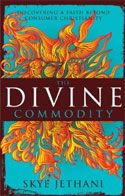
The Divine Commodity is not for wimps. If you choose to read the latest literary offering by the managing editor of the Leadership Journal, know that you’ll most likely be challenged. Deeply.
Commodity takes most of the sacred cows of American Christianity (big buildings, big budgets, experience-based worship, etc.) and throws them on the grill of biblical wisdom and ancient tradition. One must have a taste for the grilled flesh of religion to consume and digest The Divine Commodity. Simply put, it’s meaty.
Skye Jethani weaves the story of an unlikely hero, Vincent van Gogh, throughout the length of the book, juxtaposing van Gogh’s faithful desire to connect to God with the modern landscape of consumer Christianity. Van Gogh was troubled by the hypocrisy and “icy coldness” he saw coming from the institutional church of his day. This “coldness” proved to be part of the inspiration for one of van Gogh’s most famous paintings, “Starry Night.” “Night” serves as a metaphor for the entire book–at once both a powerful polemic against consumer Christianity and preferred vision for the future of the church.
Jethani illustrates his own conflicts with the “icy coldness” of the American church by narrating an epiphany he had while at a ministry conference hosted by a “very large church.” Jethani describes feeling suffocated by the lasers, lights and loud worship and needing to step out on the balcony for some fresh air. It’s all a bit too much.
It’s on that balcony that Jethani frames the question he spends the rest of the book answering: “Has the contemporary church been so captivated by the images and methods of the consumer culture that it has forfeited its sacred vocation to be a counter-cultural agent of God’s kingdom in the world?”
That’s a great question.
Of course, Jethani’s thesis directly challenges how we go about “marketing” our churches. How often do you see sermon series based on popular television shows? What about using bait-and-switch marketing techniques just to get “butts in the seats” on Sunday mornings? This is nothing compared to the way the American version of the gospel that has taken shape in the last few decades–“If you accept Jesus as your Lord and Savior, then your life will be perfect/full/happy/meaningful, etc.” That sounds an awful lot like a commercial … Maybe because it is?
Jethani weaves together a powerful narrative that spans all areas of social and religious life–economics, spirituality, consumerism, education, art and science. He writes a scathing rebuke on the current consumeristic climate in many of our churches that is tempered by grace, wisdom and forward-movement.
If you’ve thought that Vincent van Gogh was just the “crazy guy who chopped his ear off,” this book is for you. If you’ve thought that American Christianity has a little too much sizzle and not enough steak, this book is for you. The Divine Commodity is about letting God’s Spirit move in power and joining him in that work. That work, as Jethani will tell you, is not for sale. God, as it were, is not a commodity.




Sara
May 28, 2010
When the pastor at a church I had attended resigned, he stated during one of his final sermons that he was looking forward to joining another church where he could “sell Jesus” again because that was all he knew, all that he wanted to do. Before he was a preacher, he was a salesman. And he was good at “selling” the Gospel. “If you do — then — will happen.” This type of cause and effect spirituality never sat well with me. It’s very western. Honestly, I don’t think I’ve seen any of this in the Bible anywhere. If I’m wrong, correct me please.
The apostles died horrid deaths. The martyrs over centuries were persecuted, burned alive, imprisoned. Those who questioned the authorities in the institutional church were kicked out, ostracized, exiled. Jesus warned that there would be persecution, not inclusion. So this “selling” of the Gospel seems to smack the opposite of what we’re called to do. Life doesn’t get easier. It doesn’t mean it will get harder either, just that perhaps we will become more aware of the world around us and perhaps The Church herself and what We are doing and should be doing.
Brilliant work, Skye.